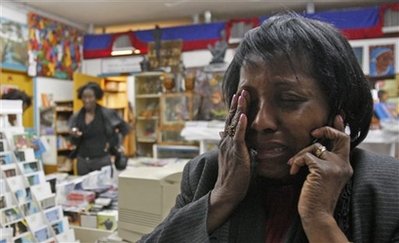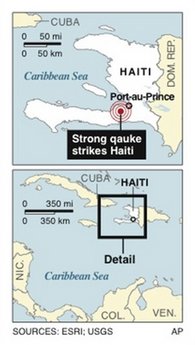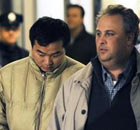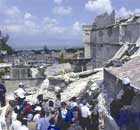Global General
Major quake hits Haiti; many casualties expected
(Agencies)
Updated: 2010-01-13 07:51
 |
Large Medium Small |
|
Edeline B. Clermont weeps in the 'Little Haiti' area of Miami on Tuesday, Jan. 12, 2010 as she talks to her sister in Boston after both were unable to contact relatives in Haiti after hearing news about the 7.0 magnitude earthquake that shook the island. [Agencies] |
PORT-AU-PRINCE, Haiti: The strongest earthquake in more than 200 years rocked Haiti on Tuesday, collapsing a hospital where people screamed for help and heavily damaging the National Palace, UN peacekeeper headquarters and other buildings. US officials reported bodies in the streets and an aid official described "total disaster and chaos."
United Nations officials said hours after the 7.0-magnitude quake struck at 4:53 pm that they still couldn't account for a large number of UN personnel.
Communications were widely disrupted, making it impossible to get a full picture of damage as powerful aftershocks shook a poor country where many buildings are flimsy. Electricity was out in some places.
Karel Zelenka, a Catholic Relief Services representative in Port-au-Prince, told US colleagues before phone service failed that "there must be thousands of people dead," according to a spokeswoman for the aid group, Sara Fajardo.
"He reported that it was just total disaster and chaos, that there were clouds of dust surrounding Port-au-Prince," Fajardo said from the group's offices in Maryland.
State Department spokesman P.J. Crowley said in Washington that embassy personnel were "literally in the dark" after power failed.
"They reported structures down. They reported a lot of walls down. They did see a number of bodies in the street and on the sidewalk that had been hit by debris. So clearly, there's going to be serious loss of life in this," he said.
The Diocese of Norwich, Connecticut, said at least two Americans working at its Haitian aid mission were believed trapped in rubble.
Alain Le Roy, the UN peacekeeping chief in New York, said late Tuesday that the headquarters of the 9,000-member Haiti peacekeeping mission and other UN installations were seriously damaged.
"Contacts with the UN on the ground have been severely hampered," Le Roy said in a statement, adding: "For the moment, a large number of personnel remain unaccounted for."
Felix Augustin, Haiti's consul general in New York, said a portion of the National Palace had disintegrated.
"Buildings collapsed all over the place," he said. "We have lives that are destroyed. ... It will take at least two or three days for people to know what's going on."
An Associated Press videographer saw the wrecked hospital in Petionville, a hillside Port-au-Prince district that is home to many diplomats and wealthy Haitians, as well as many poor people. Elsewhere in the capital, a US government official reported seeing houses that had tumbled into a ravine.
Kenson Calixte of Boston spoke to an uncle and cousin in Port-au-Prince shortly after the earthquake by phone. He could hear screaming in the background as his relatives described the frantic scene in the streets. His uncle told him that a small hotel near their home had collapsed, with people inside.
"They told me it was total chaos, a lot of devastation," he said. More than four hours later, he still was not able to get them back on the phone for an update.
Haiti's ambassador to the US, Raymond Joseph, said from his Washington office that he spoke to President Rene Preval's chief of staff, Fritz Longchamp, just after the quake hit. He said Longchamp told him that "buildings were crumbling right and left" near the national palace. He said he had not been able to get through by phone to Haiti since.
With phones down, some of the only communication came from social media such as Twitter. Richard Morse, a well-known musician who manages the famed Olafson Hotel, kept up a stream of dispatches on the aftershocks and damage reports. The news, based mostly on second-hand reports and photos, was disturbing, with people screaming in fear and roads blocked with debris. Belair, a slum even in the best of times, was said to be "a broken mess."








